How often do you daydream about starting your own business? Here’s a beacon of hope—according to Wells Fargo, women-owned businesses represent 39% of all businesses – over 14 million – employing 12.2 million workers and generating $2.7 trillion in annual revenue.
The pandemic put a renewed focus on women-owned businesses, too. According to the same research, from 2019 to 2023, women-owned businesses’ growth rate outpaced the rate of men’s 94% for number of firms, 253% for employment, and 82% for revenue. Impressive numbers, right? The impact that women-owned businesses make on the economy is undeniable.

While there are many reasons women decide to start their business, data from the World Economic Forum shows that almost three in four women (73%) cite job scarcity as the main reason for their business startup, compared to about two-thirds of men (67%).
If you’re looking for ideas that will get you amped about starting your own business, I’ve created a list of over 50, including best practices, tips from inspiring women business owners, and a step-by-step guide to help you get started.
Let’s dive in.
50+ of the Best Business Ideas for Women
More than a decade ago, women-owned businesses were concentrated in just three industries: other services (e.g., salons, pet care), professional services (e.g., legal, consulting), and healthcare and social assistance (e.g., daycare, homecare). Now, half of all women-owned businesses (50%) are spread across four key sectors:
- Other services (hair and nail salons, pet care, laundries, and dry cleaners) account for 16% of all women-owned businesses.
- Professional, scientific, and technical services (legal, bookkeeping, and consulting businesses) account for 14% of all women-owned businesses.
- Administrative, support, and waste management, and remediation services (office administration, staffing agencies, and security and surveillance services) account for 12% of all women-owned businesses.
- Healthcare and social assistance (child daycare and home care providers, mental health practitioners, and physicians) account for 11% of all women-owned businesses.
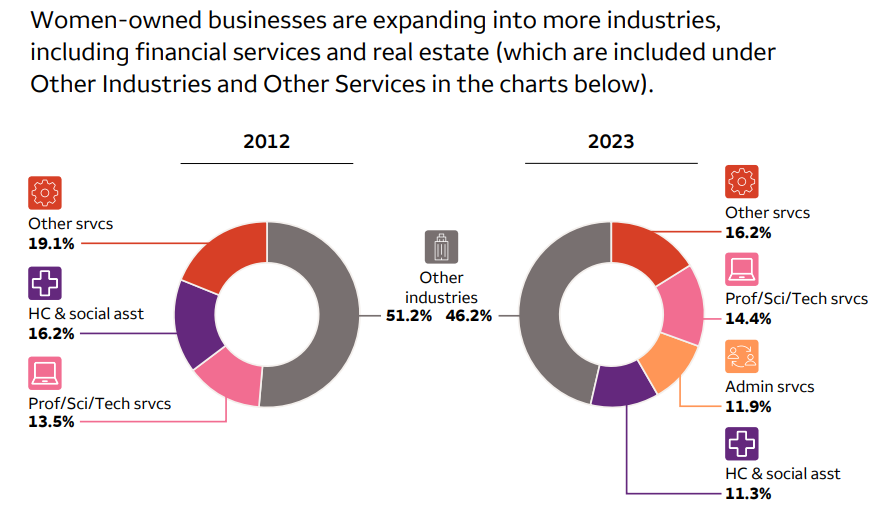
While these industries have the most women-owned businesses, the good news is that women-owned businesses are expanding into more industries. If you aren't sure where to start or need some ideas, here’s a list of over 50 business ideas for women entrepreneurs to get your creative gears turning.
Best small business ideas for women
Isn’t every woman’s dream to own a bookstore café? I know mine is. I find the idea of owning a small business, whether it’s a bakery, makeup salon, or flower shop…it’s just so wholesome. My entrepreneurial journey began at the age of 19. On Valentine's Day, after countless hours exploring Etsy, I launched my own shop to sell the jewelry I assembled.

Over time, this project became way more than a small online shop. As time went on, this venture turned into a valuable learning experience. I experimented with various pricing strategies, sales techniques, marketing partnerships and even explored different platforms. This taught me invaluable lessons about owning a business, and I was able to pull from my hands-on experience within the world of ecommerce and leverage that perspective as a writer.
Even if it’s not the biggest business venture, for women, getting started will put you on the fast track and help you learn everything you need to run your own business, as you’ll be in charge of every aspect of the business.
Here are a few initial small business ideas to explore:
- Jewelry business
- Catering
- Bakery business
- Makeup and hairstyling business
- Event planning business
- Pet-sitting business
- Pet grooming salon
- Cleaning services
- Wedding planning business
- Landscaping business
- Real estate business
- Bookkeeping services
- Flower shop
- PR agency
- Home health services
- Bookstore cafe
Online business ideas for women
Deciding to quit your job and become a business owner is not an easy call to make. That said, you can always start with part-time gigs and side hustles before you jump in with both feet. I did the same thing. I started freelancing while working full-time in public relations before quitting to work for myself.
The good news: the internet makes it easy to test your entrepreneurial spirit and offer services online or even sell products. Digital products are intangible assets; things like downloadable templates, courses, or eBooks that don’t require keeping physical inventory. You can sell them repeatedly, making them the perfect business opportunity for women who want to test the waters of entrepreneurship, as they have low upfront costs and high potential ROI.
If you’re already a digital creator, you don’t even have to start from scratch. I used this approach when I compiled my existing newsletters and blog posts with actionable how-to lessons into an ebook, “Write Better Right Now,” where I share writing lessons and exercises that help content creators improve their writing quality and bump up their writing efficiency.

On top of that, I’ve recently started experimenting with a new community for writers on Whop. Members get instant access to my writing brief template, live trainings, direct access to ask writing-related questions in the private forum, and giveaways. Building an online community can be a great way to grow genuine connections and share your knowledge and passion with like-minded individuals, and digital products can be a great way to make money and give you a solid foundation for future business ventures.

There’s also an opportunity for you to become a go-to source of information around a topic you’re passionate about. Marketer Krista Doyle created a media site called Taypedia, for example, that covers news and products for fans of Taylor Swift. With this site, she can monetize through affiliate links, newsletter sponsorships, and brand partnerships.

There are many online business ideas you can test part-time before dedicating all your time and effort to one business. Here are some other ideas to consider around digital products:
- Freelance writing
- Proofreading
- Create and monetize a community
- Transcription services
- Translation services
- Selling digital products
- Home tutoring
- Social media influencer
- Course creator
- Dropshipping
- Virtual assistant
- Affiliate marketing
- Fitness coaching
- Personalized family meal plans
- Web design
- Social media management
- Online coaching
Home business ideas for women
Some women like the idea of owning a business because of its flexibility, allowing them to work from home. And yes, you can start plenty of businesses from the comfort of your home.
Some of the most popular ideas for work-from-home business models are things like making candles or homemade beauty products. The reason is that many homemade beauty product recipes are online, and you can quickly turn a corner of your apartment or a room in your house into your beauty lab.
Another popular idea is refurbishing and reselling furniture. If you’re often scrolling through social media, I bet you’ve come across a reel or a TikTok that shows how an old piece of furniture can look like new if you invest a little time and effort into fixing it up. Remember that for this business, you’ll need specific tools such as an electric sander, safety glasses, a dust mask, gloves, hammers, screwdrivers, etc. However, once you make the initial investment, you can use your equipment again.
Another interesting business model for women that doesn’t require a physical storefront is a “cloud” kitchen—a delivery-only kitchen that prepares food for online orders without a dining area. As long as you comply with your state’s cottage laws and have the proper certifications (like a food handler’s license), you can make and sell food you prepare either at home or in a rented kitchen space.
There are plenty of other business ideas out there that allow women to run a business successfully while juggling family life. Here are some of them:
- Candle-making
- Homemade beauty products
- Refurbishing/reselling furniture
- Cloud kitchen or baked goods
- Urban farming (vertical farming and microgreens)
- Online fashion boutique
- Print on demand or screenprinting
- Data entry
Eco-friendly business ideas for women
Women business owners can strengthen their brand and business reputation by amplifying their sustainability initiatives. This will also allow them to get easier access to funds. According to EY’s study, women founders are more likely to receive funding when their narratives include social impact components.
Some of the ideas we’ve already mentioned can be turned into sustainable initiatives, such as clean beauty, which focuses on beauty products made with safe, non-toxic, and environmentally friendly ingredients.
Creating wooden toys is another interesting business idea. Unlike plastic toys, wooden toys are environmentally friendly and can last for generations, reducing the waste that ends up in landfills. Besides being free from harmful chemicals and plastics, which makes them safe for children and the environment alike, there’s also something special in the charm and simplicity of wooden toys.
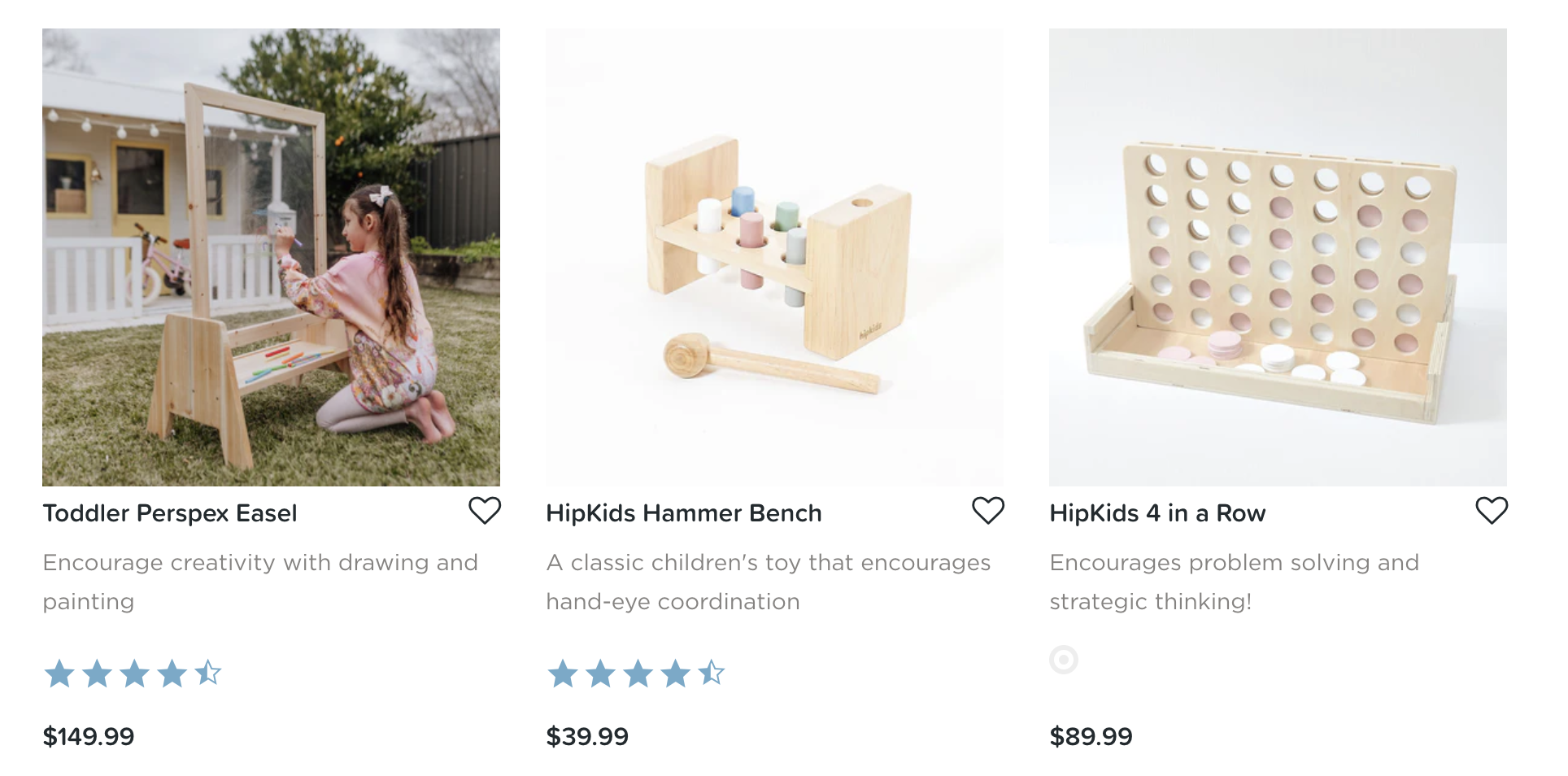
Here are some other ideas for eco-friendly businesses you can start:
- Ethical fashion
- Clean beauty and cosmetics
- Organic and sustainable farming
- Garment upcycling
Creative business ideas for women
Imagine waking up every day excited to dive into a world where your creativity is not just a hobby, but a thriving business. If you're an artist, a crafter, or someone who just loves turning unique ideas into reality, there are plenty of opportunities and business ideas for women like you.
I’ve always been fascinated by handmade ceramics. The entire process, the level of detail, and the final look of the pieces always get me. Patrícia Pereira is the person behind Coral Ceramics, which sells handmade pieces made from high-quality clay. Each piece takes an average of four weeks to finish, so it’s a very time-consuming (but also rewarding) process. As such, her pieces sell for a higher price point, making them treasured gifts and heirlooms for years to come.
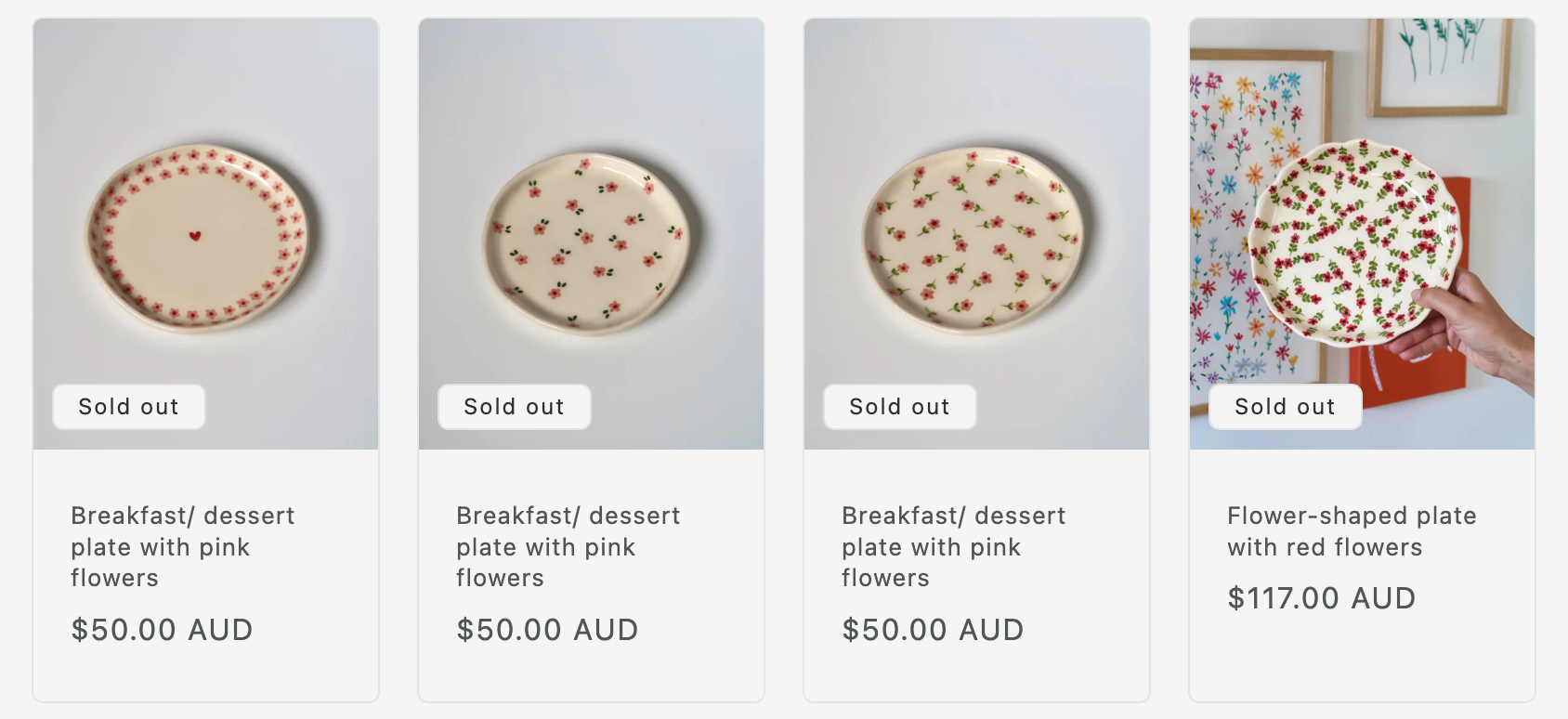
Another creative business idea is designing and selling planners or workbooks. Aileen Xu founded Lavendaire in 2014 as a resource for personal growth and lifestyle design. In December 2016, Aileen created the first Artist of Life Workbook journal for self-discovery, goal setting, and inner well-being. Since then, its quality and content have improved each year.
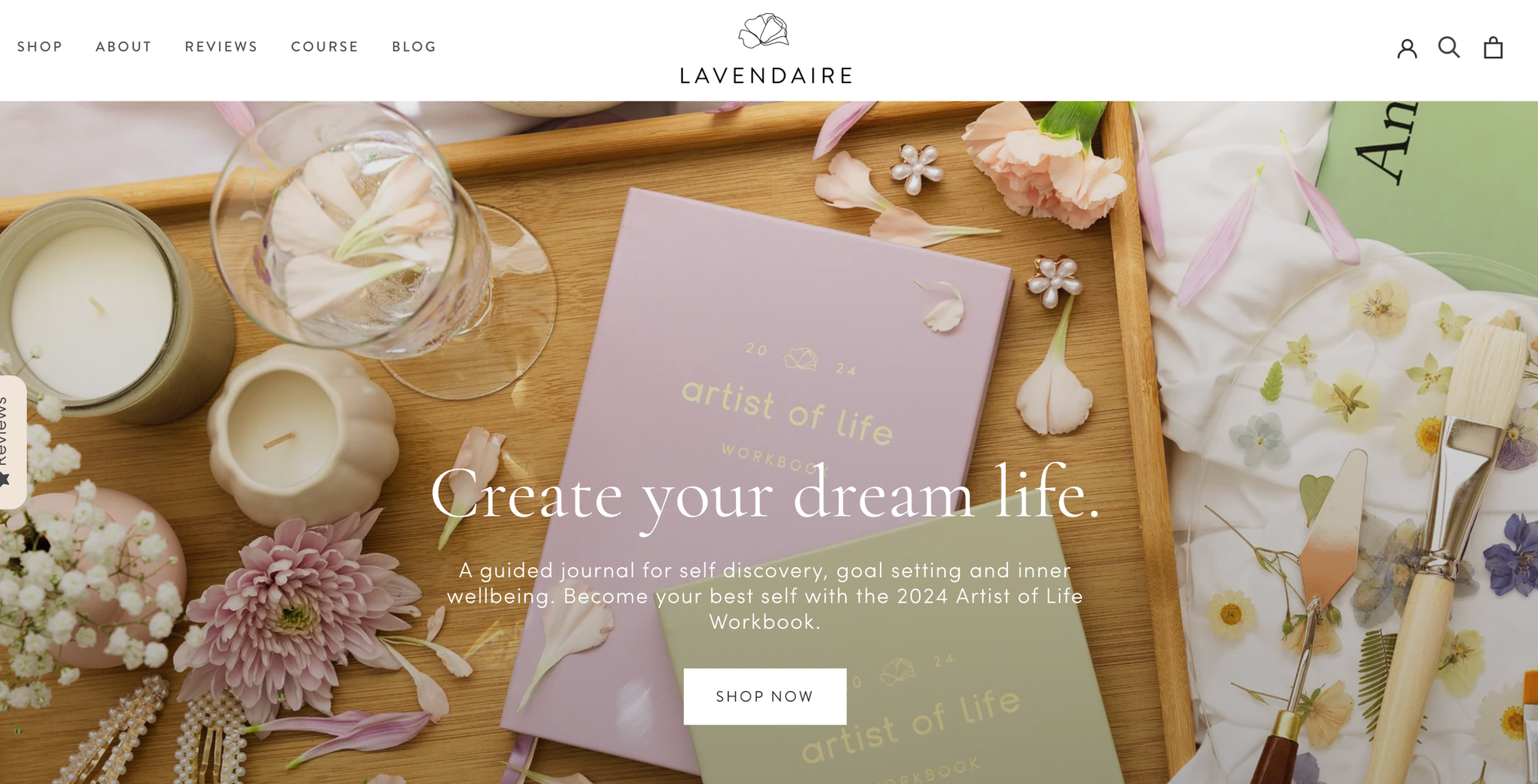
If you enjoy crafts and creativity, these ideas might be a good fit for your next business:
- Wedding invitations design
- Handmade crafts
- Photography services
- Interior design business
- Digital marketing business
- Gift box subscription service
- Design and sell planners
- Subscription-based learning boxes
- Embroidery tutorials
- Hand knitted toys
- Pottery business
And there you have it—more than 50 creative and fulfilling business ideas to inspire you on your journey to becoming a woman entrepreneur. Will it be easy? Probably not. Will it be worth it? 100%.
“Buckle up for the greatest adventure during which you’ll be tested in every possible way, and every day, you will learn something invaluable and new, and solve problems you’ve never dreamed of. Be the leader you always wanted to have!”
- Anna Gat, Founder of InterIntellect
10 Steps to Start a Business: Tips and Best Practices
Now that we’ve covered the “what,” it’s time to think of the “how.” Starting a business is not an easy task, but don’t worry, there are steps you can follow to ensure you don’t miss something along the way.
1. Identify your business idea
I’ve listed over 50 ideas here; truthfully, you can find plenty more on the internet. However, instead of getting stuck on the first step and overthinking things, think about a business idea that aligns with your passions, skills, and market needs. When you do this, your business won’t feel like work.
Ask yourself the following questions:
- How much time do you have to invest in your business?
- Do you prefer to work from home or at an office or workshop?
- What interests, passions, and skills do you have?
- Do you prefer selling digital products rather than physical products?
The business you build will be your daily reality. Make sure you choose something you love and something that excites you. What is one thing you look forward to and always lights up your day? Build your business around that to get the much-needed spark even when things get hard.
“Build a brand that resonates, not just a business that sells. Connection is the key to longevity.”
-Jess Cervellon, Consultant at Open Late Collective
2. Validate your business idea before launching
Having a passion for something is not enough for a business; it needs to be viable, too. That’s why you need to validate your idea before you start. Conducting research can help you explore the potential and understand how others would react.
You can create a survey to measure customers’ sentiment and demand for your product or service. Don’t be afraid to reach out to your friends and family and social media connections to see what they think about your business idea. You’ll be surprised how many constructive ideas you can gather along the way, which will help you build your business on a solid foundation.
3. Develop a business plan
The next step is to paint the bigger picture for your business. What is your mission, vision, and goal? Determining these will give you the much-needed clarity at this point in the journey.
Conduct a market analysis to immerse yourself in the landscape of your chosen industry. Start by understanding your target market—who are they, what are their needs, and what motivates their purchasing decisions?
Next, study your competition closely. Identify their strengths and weaknesses, and uncover gaps in the market that you can exploit. Finally, watch industry trends and shifts that could impact your business.
By gathering these valuable insights you’ll be better equipped to decide on your business model. From subscriptions and memberships to ecommerce, apps, and marketplaces, choosing the type of business that’s right for you can be crucial for your success.
During this step, you should also define your pricing strategy. Don’t be afraid to charge for the value you provide. Many women entrepreneurs struggle to charge what they are worth. As a freelancer and solopreneur, I’ve been there. Show customers exactly what they can expect from your products or services and then charge accordingly.
“Charge what your business is worth. It doesn’t have to be perfect, but it does have to be good. If you have to beg for eyeballs, you haven’t positioned it right. Ask someone to use it in front of you (same with your website) and note how they perceive it and where they get stuck or confused.”
-Katharine McKee, eCommerce consultant
Once you define this, develop a marketing plan to reach and attract your target audience. Craft strategies that resonate with your customers’ needs and interests, using channels they frequent and messages that speak directly to them. Whether through social media, content marketing, or email campaigns, ensure your approach is consistent and compelling.
Create a budget with detailed forecasts, including startup costs, operating expenses, and revenue projections. Begin with a comprehensive list of initial investments required to launch your business, followed by a clear breakdown of ongoing expenses. Then, estimate your expected revenue based on market research and sales goals.
4. Take care of legal and compliance requirements
I feel you if you get slightly frightened or worried just by thinking about legal and compliance requirements. I’ve been through the same emotional rollercoaster. However, taking care of all the administrative tasks upfront will give you peace of mind later, and that’s priceless.
To start your business, register it with local, state, and federal entities to establish its official status. Then, obtain the necessary licenses and permits to comply with local regulations and industry standards. Understanding these regulations is crucial to operating legally and avoiding potential pitfalls.
Next, open a dedicated business bank account to manage finances separately from personal funds, ensuring clear and accurate financial tracking. Finally, set up a system for managing accounting to keep track of expenses, revenues, and taxes, which is essential for maintaining financial health and making informed business decisions. The good news is you can always ask for help for the things that overwhelm you; if you’re not an accounting whiz, hire someone who is.
“Focus on what you’re good at and hire others to help you with what you’re not (e.g., contracts, taxes, admin.) Don’t ignore those aspects of the business, because they don’t go away.”
-Ashley Cummings, Travel Blogger
5. Secure funding
Securing funding for your business starts with figuring out exactly how much capital you'll need to get things off the ground and keep them running smoothly. Consider various funding avenues—personal savings, loans, grants, venture capital, crowdfunding, and angel investors.
Make sure to explore opportunities specifically designed for women entrepreneurs, as these can offer not just financial backing but also valuable networks and support. By piecing together this financial puzzle, you’ll create a strong foundation for your business and set yourself up for success.
6. Build your brand
Next, you want to stand out from the crowd. Branding can help with that. Start by designing a logo, creating a visual signature, and defining your tone of voice. If your business relies on your personal brand, be more vocal and position yourself as a leader in your niche as a go-to source of information.
Next, establish a vibrant online presence across various channels—social media, your website, and digital platforms—like crafting a digital storefront where your brand’s (or your) personality shines. This way, you’ll be able to build trust and draw in customers.
7. Set up operations
This is when things get real. When setting up operations for your business, you need to consider several key factors. First, you must determine whether you need a physical location, such as an office or retail space, or if the business can operate virtually or from a home base. This decision influences the choice of location and associated costs.
Equally important is evaluating the equipment and technology you need for daily operations, including computers, materials, or specialized tools. In some cases, starting a business is as simple as creating a digital product and using different tactics to boost sales.
8. Launch your business
As the countdown to launching your new business begins, generating buzz and excitement should become your key focus. By building a pre-launch campaign that teases your product or service, you can create a sense of eagerness and build a community of interested followers (and potential customers).
Another tactic businesses often use is creating a waiting list or pre-order, which helps you kickstart your business and generates revenue for your business operations. Don’t forget that running a business is a marathon, not a sprint. Embrace the good and the bad days and keep pushing forward.
“Building a business is a roller coaster ride. You accept you are getting on the ride and riding the ups and downs. Both are part of the process to get to the destination. But if you start to feel sick, you need to get off the ride and rest for a bit.”
-Amanda Goetz, writer and creator
9. Monitor and adjust
Even if you’re not a data analytics wizard, keeping track of your results is necessary for every business owner. Use metrics and analytics to monitor business performance and customer feedback.
Instead of focusing only on the hard data, pay attention to what your customers say on social media, in reviews, and in forums, too. These insights will help you make necessary adjustments based on data and demand. Don’t get discouraged by numbers or negative comments. Try to look at everything as objectively as you can and embrace every situation as a lesson.
“Be a results person, not a deliverables person — whoever you're working for or with. It's easy to trot out process and protocol and formality. Also, get "fail" out of your vocab immediately. Clean up how you talk to yourself. Fast.”
-Grace Clarke, marketing consultant
10. Build and nurture your network
No woman is an island. To succeed in your business venture, you need all the help you can get from your community. Focus on building a strong network of people who support you along the way.
Building and nurturing your network when starting a business is crucial. It provides valuable connections, resources, and support that can significantly accelerate growth and open doors to new opportunities.
“Your network will help you get from 0-1 the fastest. Build and nurture relationships, don't be afraid to ask for help, and always be thankful enough to find ways to give back to those friends.”
-Tina Donati, content agency owner
Start Your Business Today With Whop
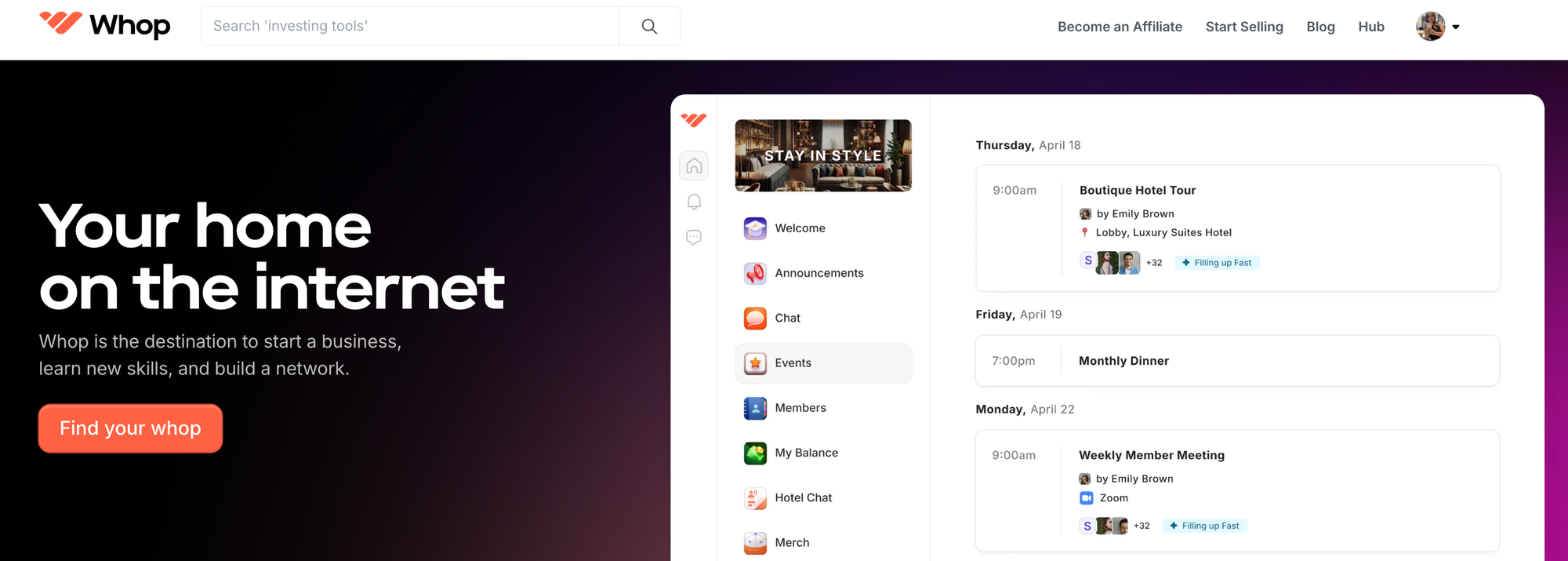
If you’ve reached this far, congratulations. You’re equipped with the ideas and blueprint you need to start your own business.
Whether you’re looking for ways to sell digital products such as ebooks or courses, explore the power of affiliate marketing, or build and monetize your community, Whop can help you make your first dollar on the internet. You can launch with Whop risk-free as there are no platform fees - Whop only makes money when you make money.
Building your store takes less than 10 minutes, so join the next generation of internet entrepreneurs building their businesses on Whop’s all-in-one platform.
FAQs
What is the best business for a woman to start?
When considering the best business for you, consider where your passions and skills intersect with market needs. Maybe you’re drawn to running an online retail store, allowing you to showcase your creativity and build a brand from anywhere.
Or perhaps your expertise in a particular field could translate into a rewarding consulting business. If you’re passionate about health and wellness, consider offering services that help others improve their lives. The key is to choose a venture that excites you and aligns with what you’re good at.
How can I start a business with limited funds?
To start a business with limited funds, focus on a low-cost business model, such as offering services instead of products, working from home, and leveraging free or inexpensive marketing tools. Selling digital products requires little (if any) investment, which can be a great way to enter the entrepreneurial waters.
What are some low-risk business ideas for women new to entrepreneurship?
Low-risk business ideas require minimal upfront investment and can be scaled gradually. Think about freelancing (writing, graphic design, consulting), virtual assistance, dropshipping, online coaching, or selling digital products like e-books or courses.
What factors should women consider when choosing a business idea?
Women should consider their interests and skills, market demand, potential profitability, startup costs, and work-life balance when choosing a business idea. They should also assess the target audience and competition to ensure their idea has a viable niche.




